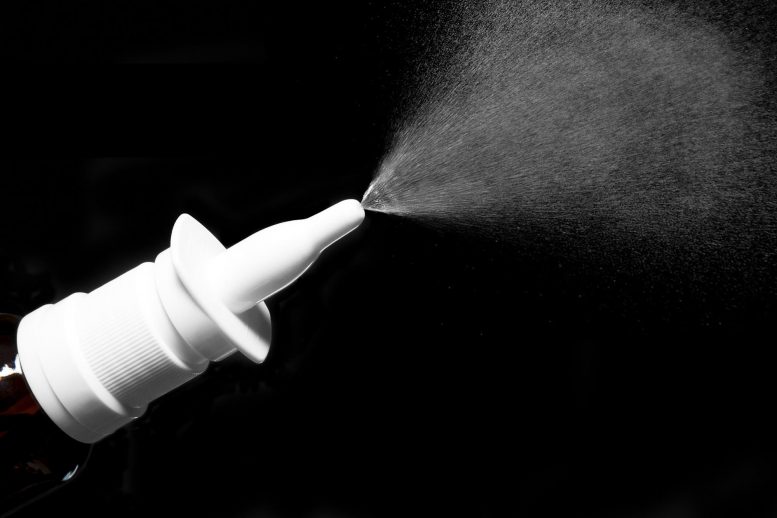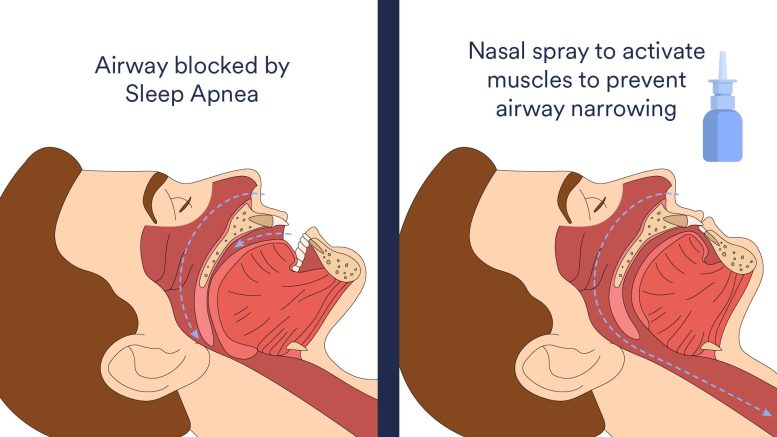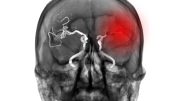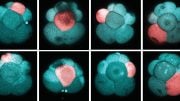
Researchers in Australia have developed a nasal spray that could lessen sleep apnea’s severity and decrease blood pressure, providing a new potential treatment for the widespread condition.
Australian researchers have discovered that a bedtime nasal spray has the potential to reduce the severity of sleep apnea in people and lower their blood pressure.
The new research published in The Journal of Heart and Circulatory Physiology offers hope to millions of people around the world affected by sleep apnoea, a common and debilitating chronic respiratory condition.
Understanding Sleep Apnea and Current Treatments
“Obstructive sleep apnea (OSA) is a sleep disorder where the muscles in the back of the throat relax and the upper airway narrows or collapses, restricting oxygen intake and causing people to wake repeatedly throughout the night,” says Professor Danny Eckert, College of Medicine and Public Health.
“It has been linked to a variety of medical conditions including cardiovascular disease, stroke, obesity, diabetes, anxiety, and depression.
“Treatment options are limited and while continuous positive airway pressure (CPAP) machines are a proven treatment for OSA, around 50 percent of people struggle to tolerate them,” he says.
Nasal Spray Research and Findings
The aim of the study was to determine the effects of a new potassium channel blocker nasal spray on OSA severity and to investigate the potential influence of different breathing approaches such as restricted ‘nasal only’ breathing and the physiological characteristics of those who had a favorable response.
“Potassium channel blockers are a class of drugs that block the potassium channel in the central nervous system.
When used in a nasal spray, the blockers have the potential to increase the activity of the muscles that keep the upper airway open and reduce the likelihood of the throat collapsing during sleep,” says lead author Dr. Amal Osman.
Using a randomized, blind trial, 10 people with OSA were given either the potassium blocker nasal spray, a placebo nasal spray or the potassium nasal spray in combination with restricted ‘nasal only’ breathing.
Seven out of the 10 people responded to the potassium channel blocker nasal spray showing a reduction in the frequency of upper airway collapsing episodes during sleep and lower blood pressure the next morning. The use of the spray with restricted ‘nasal only’ breathing did not improve quality of sleep in this trial.
Conclusions and Future Prospects
“What we have discovered is that the nasal spray application of the potassium channel blocker that we tested is safe, well tolerated. Those who had a physiological improvement in their airway function during sleep also had between 25-45% reductions in markers of their OSA severity including improved oxygen levels as well as a reduction in their blood pressure the next day,” says Dr. Osman.
“These insights provide a potential pathway for development of new therapeutic solutions for those people with OSA who are unable to tolerate CPAP machines and/or upper airway surgery, and those with a desire for alternatives to existing therapies,” says Professor Eckert.
“Right now, there are no approved drugs for treating OSA, but through these findings and future research we are getting closer to developing new and effective drugs that are safe and easy to use,” says Professor Eckert.
Reference: “A novel TASK channel antagonist nasal spray reduces sleep apnea severity in physiological responders: a randomized, blinded, trial” by Amal M. Osman, Barbara Toson, Ganesh R. Naik, Sutapa Mukherjee, Martina Delbeck, Michael Hahn, Thomas Muller, Gerrit Weimann and Danny J. Eckert, 22 February 2024, American Journal of Physiology: Heart and Circulatory Physiology.
DOI: 10.1152/ajpheart.00541.2023
Acknowledgments: The authors would like to thank the Adelaide Institute for Sleep Health research support staff Charmaine O’Reilly, Christopher Bull, Kelly Loffler, Laura Bandick, and Alison Teare for their assistance. We are also very grateful to the study participants for volunteering for this multi-visit protocol.
Disclosure Statement: This work was supported by an investigator-initiated research grant from Bayer (sponsor). DJE is funded by a National Health and Medical Research Council of Australia Leadership Fellowship (1116942).
Outside the submitted work, DJE has had research grants from Bayer, Takeda, Invicta Medical, Apnimed, Eli Lilly, and Withings and has served on Scientific Advisory Boards or as a consultant for Apnimed, Invicta, Mosanna, Takeda, and Bayer.










OMG!!! What a great promising med in the pipeline. I’ve been using my CPAP about two yrs., glad to have it, but is a step above for the disease. May it come on the market in rapid time!!!
Would this help with snoring, too? Plenty of people sleeping with a partner are probably losing years off their life due to their sleep being wrecked by a partner’s snoring. These partners are externalizing the cost of their bodily impairments onto another person!
I’m glad that they have found a alternative to sleep masks for sleep apnea. I have a hard time tolerating my mask. A nasal spray sounds promising, hope that it’s out soon.